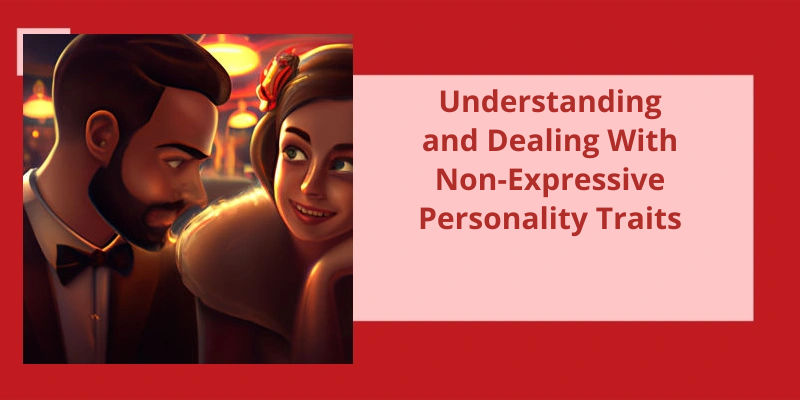Human beings are known to be emotional creatures, with the ability to interact and communicate using a complex range of feelings and expressions. This condition is known as alexithymia, and those who experience it may have difficulty experiencing empathy, communicating their needs, and establishing meaningful relationships with others.
What Does It Mean When a Person Is Not Expressive?
When a person isn’t expressive, it can be quite difficult to understand what they’re thinking or feeling. This lack of expression can lead to misunderstandings and even cause problems in relationships. Often, people who aren’t expressive may come across as being disinterested or bored, even if they’re not. They may also have difficulty communicating their thoughts and feelings to others, which can make it difficult for them to form close connections with others.
Some people simply have a more reserved personality, and prefer to keep their thoughts and feelings to themselves. Others may have had negative experiences in the past, which have made them hesitant to express themselves openly. In some cases, a person may have an underlying mental health condition, such as depression or anxiety, which can make it difficult for them to express themselves.
One way to become more expressive is to practice expressing your thoughts and feelings in a safe and supportive environment. This could mean writing in a journal, talking to a therapist or trusted friend, or even joining a support group. This can help you become more aware of how you come across to others, and may help you become more comfortable expressing yourself.
By practicing expressing your thoughts and feelings, paying closer attention to your body language and facial expressions, and seeking the help of a therapist or support group, you can learn to express yourself more openly and connect more deeply with those around you.
Expressions are one of the most crucial elements of non-verbal communication. They help people convey their thoughts, emotions, and opinions without using words. An expressive person is someone who’s adept at using facial expressions, gestures, and tone of voice to convey their thoughts and emotions to others. Being expressive can help improve the overall quality of communication, making it easier for people to understand one another. In this article, we will explore the intricacies of being expressive and what it means for you as a person.
What Does It Mean if You’re Expressive?
Expressiveness is a highly valued trait in many cultures. People who’re expressive are typically seen as more authentic and more trustworthy than those who’re not. When a person is expressive, they’re able to communicate their emotions and thoughts in a clear and transparent way that the listener can easily understand. This makes it easier for others to relate to them and to form deeper connections with them.
For example, a person might use hand gestures to emphasize a point, or they might use a certain tone of voice to convey their excitement about something. These subtle cues can be picked up by the listener and can help them to better understand the speakers intentions.
However, being overly expressive can also have it’s downsides. Some people may find it difficult to control their emotions and may end up oversharing or expressing themselves in a way that’s inappropriate for the situation at hand. In such cases, being expressive can actually hinder rather than help communication, as it can make others feel uncomfortable or overwhelmed.
The Relationship Between Expressiveness and Emotional Intelligence
This article explores the connection between an individual’s ability to express their emotions and their emotional intelligence. It discusses how being able to effectively communicate feelings can lead to better emotional awareness and understanding.
Source: What does it mean to be emotionally expressive?..
Being unexpressive isn’t necessarily a bad thing. It’s simply a personality trait where one may have difficulty conveying their emotions or communicating effectively. However, it can lead to misunderstandings and frustration in both personal and professional relationships. In this article, we will explore the causes of unexpressiveness, it’s effects on different aspects of life, and ways to overcome it.
What Is an Unexpressive Person?
An unexpressive person is someone who’s unable to convey their thoughts, emotions and feelings through words or actions. Such an individual appears to be emotionally vacant and appears to have no interest in communicating or interacting with others. They may appear to be blasé, indifferent or disinterested in the environment or the events around them.
This kind of person may not be willing to participate actively in conversations or other forms of social interaction. They prefer to remain quiet and may come across as cold or reserved. Engaging with an unexpressive individual can be frustrating and even challenging, as their lack of responsiveness can be demotivating and uninviting.
Unexpressive people often fail to convey their expectations and expectations of others, which can lead to misunderstandings and conflicts, particularly in group settings. They may appear aloof or indifferent to others opinions or ideas, which can make it difficult for others to build rapport with them.
Individuals who’re unexpressive may have an underlying fear of judgment, rejection or confrontation, which could prevent them from expressing their thoughts and feelings. This inability to communicate their emotions can result in feelings of loneliness, isolation and frustration. It’s essential to approach such individuals with patience, empathy and understanding, as they may be going through a difficult or challenging phase in their lives.
This lack of expression makes it harder for them to communicate with people around them, causing them to feel disconnected and isolated.
People with an Expressive personality tend to have a natural ability to connect with others, using their verbal skills and social grace to build strong relationships. They enjoy being around people and are often the life of the party, drawing others into conversations with their effusive and engaging personality. In this article, we will explore some of the key traits and characteristics of the Expressive personality, and how they can be harnessed to achieve success in both personal and professional settings.
Who Is a Very Expressive Person?
Expressive people are often the life of the party, able to make a room light up with their contagious energy and enthusiasm. They’re typically very outgoing, sociable individuals who thrive on interaction with others. Whether in a personal or professional setting, these individuals are able to quickly adapt to different social situations and have an uncanny ability to put others at ease.
Whether in personal or professional settings, these individuals are able to command attention and build strong relationships with others. With their excellent communication skills and persuasive nature, expressive individuals are often seen as highly effective leaders and influencers in their respective fields.
The Benefits and Drawbacks of Being a Very Expressive Person.
Being a very expressive person can have benefits such as effective communication and building strong relationships, but it can also have drawbacks such as being overwhelming and causing misunderstandings.
It’s important to understand what emotional expressivity means because it can greatly impact how we navigate our relationships and communicate our feelings. The 1994 study defines emotional expressivity as a consistent behavior that varies from person to person regardless of the type or way emotions are conveyed. This individual characteristic can have a profound impact on how we interact with others, so let’s explore it further.
What Does Being Emotionally Expressive Mean?
Being emotionally expressive means having the ability to openly communicate and display ones emotions, regardless of their valence or channel. Emotional expressivity is a defining characteristic that varies from person to person. Some people find it easy to express their emotions while others struggle to do so, whether due to societal expectations or personal beliefs.
Individuals with high emotional expressivity are often perceived as being authentic and easy to read. Many people feel comfortable around them because they don’t have to guess how theyre feeling. Conversely, those with low emotional expressivity may struggle to connect with others on an emotional level as they may find it difficult to communicate their feelings effectively.
Some people may show intense emotions while others may be more subdued. It’s important to note that emotional expressivity isn’t the same as emotional intelligence. One can be emotionally expressive without having a high level of emotional intelligence.
It’s been linked to better mental health outcomes.
Conclusion
It can lead to difficulties in relationships, communication, and overall quality of life. It’s important to recognize and understand alexithymia in order to provide support and treatment for those who may be struggling with this condition. Through increased awareness and education, we can work towards a greater understanding and acceptance of individuals who experience difficulties with emotional expression.






